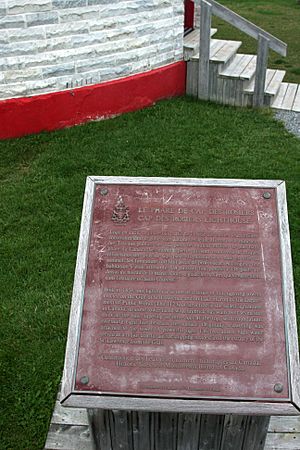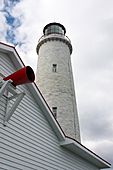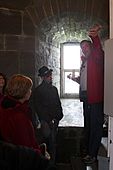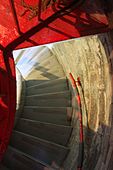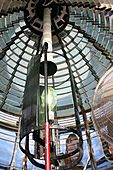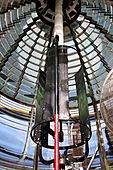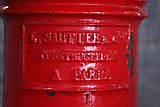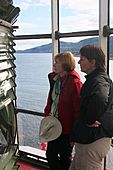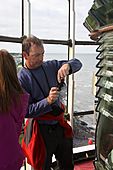Cap-des-Rosiers Lighthouse facts for kids
| Location | Gaspé Quebec Canada |
|---|---|
| Coordinates | 48°51′22.5″N 64°12′03.8″W / 48.856250°N 64.201056°W |
| Year first constructed | 1858 |
| Automated | 1981 |
| Foundation | stone, up to 8' deep |
| Construction | limestone tower, faced with white marble |
| Tower shape | cylindrical tower with balcony and lantern |
| Markings / pattern | white tower, red lantern and trim |
| Height | 34.1 metres (112 ft) |
| Focal height | |
| Original lens | first-order fresnel lens |
| Range | 24 nautical miles (44 km; 28 mi) |
| Characteristic | Oc W Flash 15 s; eclipse 5 s. Year round |
The Cap-des-Rosiers Lighthouse (which is Phare de Cap-des-Rosiers in French) is a very tall lighthouse. You can find it near the village of Cap-des-Rosiers in Gaspé, Quebec, Canada.
This lighthouse is super important! It was named a National Historic Site of Canada on June 11, 1973. Later, on March 31, 1994, it was also listed as a Federal Heritage Building.
The Cap-des-Rosiers Lighthouse is the tallest lighthouse in all of Canada. It stands 34.1 metres (112 ft) high! It's built on a steep cliff on the south side of the Saint Lawrence River. This spot is right where the river meets the big Gulf of St. Lawrence. If you visit in the summer, you can even take a tour inside!
Contents
Why This Lighthouse Is Special
The Cap-des-Rosiers Lighthouse was built in 1858. It was part of a group of tall lighthouses built by the government. These lighthouses helped ships find their way safely. They guided boats coming into the Saint Lawrence River from the Gulf.
Building the Tallest Lighthouse
This lighthouse is 34.1 metres (112 ft) tall, making it the highest in Canada. Its strong stone tower is covered with white marble. At the bottom, the walls are over seven feet thick! They get thinner towards the top, becoming three feet thick. The foundations go eight feet deep into the ground.
When it was first built, there was a house attached to the tower. This was for the lighthouse keeper and their family. The powerful light was 136 feet above the water. It was a major guide for ships.
Honoring Its History
In 1977, a special plaque was placed at the lighthouse. The Historic Sites and Monuments Board of Canada put it there. This plaque tells visitors about the lighthouse's important history. It reminds everyone how vital it was for shipping.
Life at the Lighthouse
For many years, people called "keepers" lived and worked at the lighthouse. Their job was to make sure the light was always shining. They kept it working day and night to guide ships safely. In 1981, the lighthouse became automated. This means machines took over the job, and keepers were no longer needed.
Weather Around the Lighthouse
The area around Cap-des-Rosiers has a type of weather called a humid continental climate. This means it has warm summers and cold, snowy winters.
Temperatures and Rain
The average temperature for the whole year is about 3.6 °C (38.5 °F). In July, which is usually the warmest month, the average temperature is around 16.2 °C (61.2 °F). January is the coldest month, with temperatures averaging about −9.8 °C (14.4 °F).
The highest temperature ever recorded here was 33.0 °C (91.4 °F) on August 9, 2005. The coldest was −32.0 °C (−25.6 °F) on February 17, 2008. The area gets about 1,195.1 mm (47.05 in) of rain and snow each year. October is usually the wettest month.
See also
 In Spanish: Faro de Cap-des-Rosiers para niños
In Spanish: Faro de Cap-des-Rosiers para niños
- List of lighthouses in Canada
Gallery
- Cap-des-Rosiers Lighthouse
-
The light source is now an electric discharge lamp. This is an occulting light, a rhythmic light in which the duration of light in each period is longer than the total duration of darkness, accomplished by this vertical rotating shutter which periodically shades the light from view. In this case, the light shines for 15 seconds, and eclipses (goes dark) for 5 seconds, and repeats.
 | Delilah Pierce |
 | Gordon Parks |
 | Augusta Savage |
 | Charles Ethan Porter |


